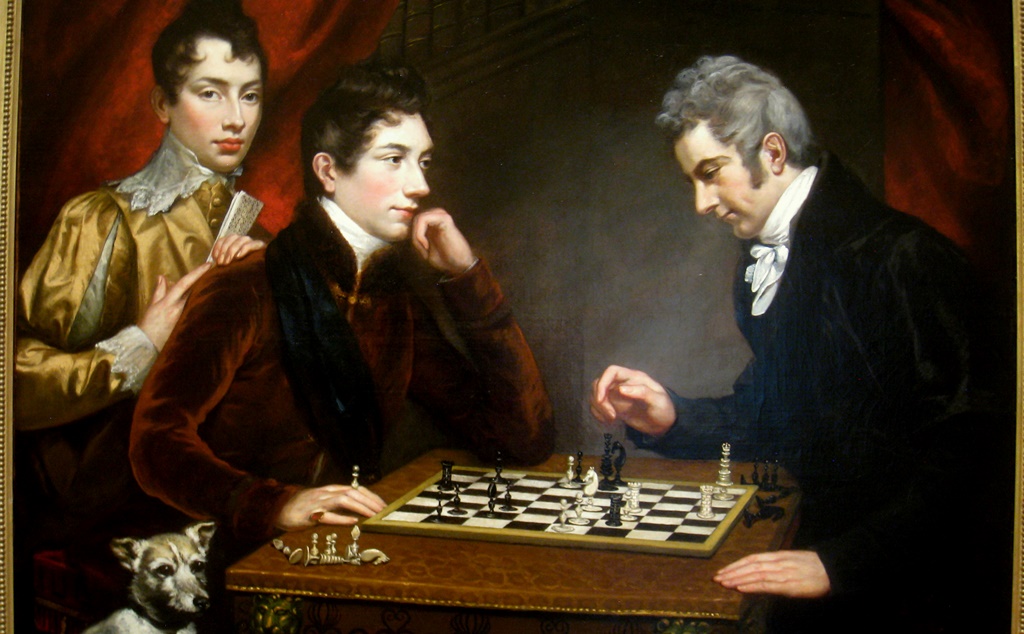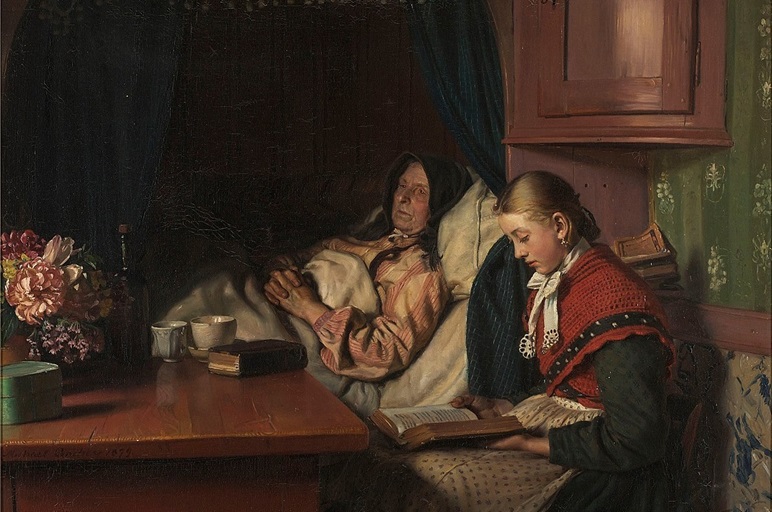.
The Unchecked Pawn
Quickly Black castled king-side and planned his attack.
White then countered with confidence, primed for a sack,
with the sneakiest strategy he could contrive:
nonchalantly he pushed his f-pawn to rank 5.
I’ll just nab it, thought Black, but wait … what’s going on?
Devil take it, I’m sure that’s a poisonous pawn!
Black surveyed the board carefully. Ah, yes! I see,
that white bishop is poised to attack from c3.
Black was pleased with himself: he was using his head
in advancing his own pawn to g5 instead.
In response White paused briefly to stifle a yawn,
then dispatched the black bishop with his cheeky pawn.
Now White’s move left that pawn hanging, out on e6,
over-ripe for the picking; but oh, what a fix
Black was in, with a troublingly weakened back rank,
and good reason, besides, to beware his left flank.
Delay now, and the chance to fight back will be gone.
Black played rook to a5, disregarding White’s pawn.
Well, there’s pawn to b4 … White considered a while.
An attack on Black’s rook would be showing some style.
No, it’s better I simply play pawn to e7:
Remember Alekhine in 1911!
What a nuisance! thought Black, frowning. Oh, how I long
To be rid of that confounded d7 pawn!
But there’s also White’s queen, lurking there … what a fright!
I’ll block her with the bishop while threatening his knight.
With a faint smile, White then replied, sealing Black’s fate:
pawn takes knight and promotes to queen—instant checkmate!
Black stared down at the board, his face pallid and drawn;
he’d been crushed through ignoring White’s bantam-weight pawn.
.
Alekhine: Alexander Alekhine (1892-1946) was a Russian and French chess champion.
.
.
Julian D. Woodruff, who contributes poetry frequently to the Society of Classical Poets, writes poetry and short fiction for children and adults. He recently finished 2020-2021, a poetry collection. A selection of his work can be read at Parody Poetry, Lighten Up Online, Carmina Magazine, and Reedsy.
















Never underestimate an opponent – a point well expressed poetically.
Thanks for reading, Paul. There are quite a few such pawns running around, and more than a few pawn pushers, too. (I’ve got a little list.)
As a former chess player, I know black must consider the pawn gambit dangerous and adjust to the attack. Defenses must be carefully planned before a counterattack. A life lesson is innate in this poem–do not ignore the innocuous events in our lives.
Thank you for reading & commenting, Roy. You’re right–it’s that incompetent playing black (& who might that be?) that we must worry about.
Are you saying this is an allegory, Julian? I was thinking the game sounded well enough without a board to map it on, but if each piece and space has a coded meaning, it could be exciting or tedious, depending on interests and viewpoints of readers. It’s about the right length to sustain drama, and the pawn becoming queen who immediately checkmates the opponent is just the Alekhine kind of conclusion–or so I’ve heard. Not much experience on my part, but enough to help out when another player is needed to make an even number. I do tend to be a pawn watcher.
What an intriguing response, Margaret. No, I hadn’t thought about positions beyond the mundanely possible in the poem’s narrative element, nor of investing the promotion with meaning beyond “white wins.” One might, but I’m afraid I’d be at it from here to eternity if I tried. Nonetheless, as my comment above indicates, I do recognize dangerous pawns out and about, and incompetent, wrongheaded, or indifferent players.
I want to see the pieces on the board, Julian, and you almost made it happen. I happen to love watching old & new games and matches, because doing so reminds me of how close I came to being obsessed with this game of kings. It’s a fine obsession of which I have had to let go since I am simply not good enough at it. The game itself is devilishly complex, though anyone can play it.
Thanks for reading, CB. My mother and I used to play, at the level of “this is the game’s object, here’s how the pieces move,” and I’ve improved only slightly since then. But like you, I enjoy checking out games old and recent, and wondering at how creativity informs even cold rationality.
I love reading about chess, but am not good at it myself. I love listening to Maurice Ashley call a game and it’s a challenge to see the board if you haven’t drilled on seeing the board through the squares/positions. Perforce, a majority of the board goes undescribed. That’s a super challenge to figure out how to be able to evoke the scene in its entirety. The briefest game would be epic length.
BTW, my fave is Alekhine. And I love the Alekhine defense, though it’s not the best at the highest levels, unless one surprises one’s opponent. Most of all, I love his quirky style, showing up at the guarded border with his cat (named, chess) declaring that the two of them needed no passport…
Thanks for reading, Daniel. I too love following games, with Agadmator, Mato et al.
My favorite has to be Philidor (about whom I’ve written both a short story and a poem). Unfortunately, discussions of his games aren’t that easy to find. The name of Alekhine (whose sordid dealings with the Nazis I think Margaret alluded to above, and which I only discovered after completing the poem) was handy to me on metrical and historical grounds.
It is interesting that both Alekhine and Capablanca — bitter opponents — were not just superb masters of the game, but also wrote books of chess analysis that are still pored over by aficionados.
Not to mention the pros, Joseph. How many of their games do you suppose Carlson has crammed in his brain?